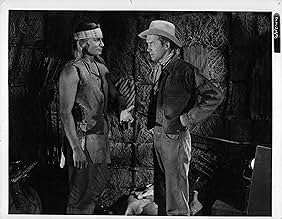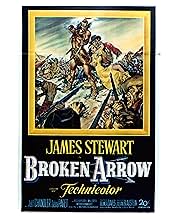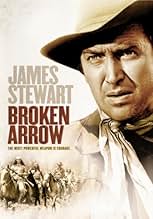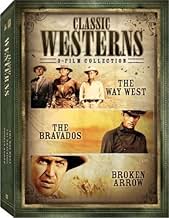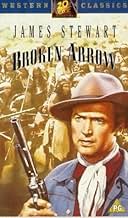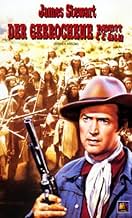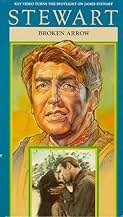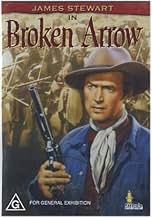CALIFICACIÓN DE IMDb
7.1/10
10 k
TU CALIFICACIÓN
Tom Jeffords trata de lograr la paz entre colonos y apaches en el territorio de Arizona.Tom Jeffords trata de lograr la paz entre colonos y apaches en el territorio de Arizona.Tom Jeffords trata de lograr la paz entre colonos y apaches en el territorio de Arizona.
- Dirección
- Guionistas
- Elenco
- Nominado a 3 premios Óscar
- 4 premios ganados y 6 nominaciones en total
Joyce Mackenzie
- Terry
- (as Joyce MacKenzie)
Robert Adler
- Lonergan - Stage Driver
- (sin créditos)
Trevor Bardette
- Stage Passenger
- (sin créditos)
Chris Willow Bird
- Nochalo
- (sin créditos)
Raymond Bramley
- Col. Bernall
- (sin créditos)
Chet Brandenburg
- Miner
- (sin créditos)
Argentina Brunetti
- Nalikadeya - Cochise's Wife
- (sin créditos)
Harry Carter
- Miner
- (sin créditos)
Iron Eyes Cody
- Teese
- (sin créditos)
J.W. Cody
- Pionsenay - Chosen Warrior
- (sin créditos)
Heinie Conklin
- Townsman
- (sin créditos)
Dolores Christine Cypert
- American Indian
- (sin créditos)
- …
- Dirección
- Guionistas
- Todo el elenco y el equipo
- Producción, taquilla y más en IMDbPro
Opiniones destacadas
When I was a young boy I saw this picture. It was the first western in which the Indians were not uncivilised barbarians, but normal people, with their own standards. It was a revelation! At last one director had the courage to show this to us. So thank you, Delmer Daves! The performances of Jeff Chandler and James Steward were touching and also Debra Paget was fantastic. I do hope to see this film again someday on DVD. Hans Dullaart Delft Netherlands.
Although the story is entertaining and the performances of James Stewart, Jeff Chandler and Debra Paget outstanding, what makes Broken Arrow a landmark film is its portrayal of the Apache Indians as something more than savage killers. Indians in the movies were always seen as brutal and inhuman. Here they are seen as people who want what the "white men" wanted: to live in freedom with their families on their own land and to live their lives in their own way.
Jeff Chandler is terrific as Apache leader Cochise, who he would play twice more in other films. There is a moving scene when they return from battle and he recites the names of those killed with a pained look in his eyes. Cochise and Stewart's character have a relationship which grows from mutual respect to a true friendship as they try to work out peace between the whites and indians. Stewart is looked on as a traitor by his friends and things are complicated further by his relationship with the young Apache girl played by Debra Paget.
I cannot think of another western in which indians have been portrayed as real people with emotions who hurt, who love. When this film was released 50 years ago, blacks, asians and American Indians were still being portrayed using the worst kinds of racial stereotypes.
Jeff Chandler is terrific as Apache leader Cochise, who he would play twice more in other films. There is a moving scene when they return from battle and he recites the names of those killed with a pained look in his eyes. Cochise and Stewart's character have a relationship which grows from mutual respect to a true friendship as they try to work out peace between the whites and indians. Stewart is looked on as a traitor by his friends and things are complicated further by his relationship with the young Apache girl played by Debra Paget.
I cannot think of another western in which indians have been portrayed as real people with emotions who hurt, who love. When this film was released 50 years ago, blacks, asians and American Indians were still being portrayed using the worst kinds of racial stereotypes.
Excellent adaptation of Elliott Arnold's book "Blood Brother" concerning the talk, the need, and the struggle for peace between the white man and the Apache Indians in 1870 Arizona. James Stewart is very effective as a brave former Scout for the Union who used to kill Indians but who now wants the slaughters to stop; he learns their tongue, sends up a smoke signal, and is soon in conference with Cochise himself to allow the U.S. mail-riders safely through Apache terrain...he also finds love with Indian princess Debra Paget, a romance his racist white brothers obviously resent (and at least one Apache soldier as well). Strong, moving story relies on the complicated interpersonal relationships between the characters for its impact, and the performances from Stewart, Paget, and Oscar-nominated Jeff Chandler do not disappoint. Beautifully filmed on rugged locations, Delmer Daves directs a winner, one of the best westerns of its era. *** from ****
Delmer Daves offers an important major role to an Indian character, treating him with quality and esteem as human being...
Stewart plays a scout who seeks to heal the divisions between the Apaches and white men But while "Broken Arrow" is a perfectly acceptable depiction of frontier struggles, it does not display Stewart to the best advantages Delmer Daves was competent enough, but he lacked the ultimate virility and intensity of Anthony Mann
"Broken Arrow" examines, rather intensely and directly, the mistreatment and flagrant exploitation of the Indians by whites in the early West
The strength of this often lyrically photographed picture which will a1ways have an honorable place among Westerns lies particularly in the touching dignity of Stewart's love and marriage to an Indian girl (Debra Paget). Indian haters, of course, stir up the usual sort of trouble and Stewart's bride becomes a victim with all the consequent poignancy for which the film is best remembered
The over-wise Chandler counsels him that he must learn to live with his whiteness just as his new friends must contend with their own place in the cosmic scheme of things Cochise has words of stark consolation for Stewart: "As I bear the murder of my people, so you will bear the murder of your wife."
The most interesting aspect of " Broken Arrow" is not the interracial romance between Stewart and Paget, but Stewart's relationship with Chandler's Cochise There is intra-character complexity here, as Chandler struggles to overcome his disturb of all whites, and Stewart attempts to comprehend the different philosophy and cultural of the Indians
Jeff Chandler was quite apt and professional He was so believable in the role of the Apache chief Cochise that he was to essay it again in George Sherman's "The Battle at Apache Pass" in 1952 Chandler's facial bone structure lent itself to noble, incisive Indian profiles, and unlike other Caucasian actors he did not look out of place He was even nominated for Best Supporting Actor at that year's Oscars
Stewart plays a scout who seeks to heal the divisions between the Apaches and white men But while "Broken Arrow" is a perfectly acceptable depiction of frontier struggles, it does not display Stewart to the best advantages Delmer Daves was competent enough, but he lacked the ultimate virility and intensity of Anthony Mann
"Broken Arrow" examines, rather intensely and directly, the mistreatment and flagrant exploitation of the Indians by whites in the early West
The strength of this often lyrically photographed picture which will a1ways have an honorable place among Westerns lies particularly in the touching dignity of Stewart's love and marriage to an Indian girl (Debra Paget). Indian haters, of course, stir up the usual sort of trouble and Stewart's bride becomes a victim with all the consequent poignancy for which the film is best remembered
The over-wise Chandler counsels him that he must learn to live with his whiteness just as his new friends must contend with their own place in the cosmic scheme of things Cochise has words of stark consolation for Stewart: "As I bear the murder of my people, so you will bear the murder of your wife."
The most interesting aspect of " Broken Arrow" is not the interracial romance between Stewart and Paget, but Stewart's relationship with Chandler's Cochise There is intra-character complexity here, as Chandler struggles to overcome his disturb of all whites, and Stewart attempts to comprehend the different philosophy and cultural of the Indians
Jeff Chandler was quite apt and professional He was so believable in the role of the Apache chief Cochise that he was to essay it again in George Sherman's "The Battle at Apache Pass" in 1952 Chandler's facial bone structure lent itself to noble, incisive Indian profiles, and unlike other Caucasian actors he did not look out of place He was even nominated for Best Supporting Actor at that year's Oscars
Tagline: Of this motion picture the screen can be proud... Today... Tomorrow... A generation from now...
Worth repeating this tagline, because after seeing the film again for the first time in 42 years, it's right on. 50s westerns almost universally depicted Indians as pigeon-English speaking savages... or tried to talk Indian that translated to pigeon-Indian.
While the leading cast is all-Anglo, the perspective is that both sides in the Wild West were had more than a few intelligent, caring individuals among them. A willingness to sacrifice much (including renegades) to achieve a lasting peace is the message.
Jimmy Stewart had something to lose by doing a picture like this, but the acting here stands with any in his career. The portrayal of Cochise by Jeff Chandler is powerful, although unquestionably a little bit too noble-savagish.
"Let's mosey on over there" is a line spoken by Stewart toward the end of the film. Takes you back to a time when people took time to mosey.
A good-hearted picture by a little-known director standing up against the prevailing stereotypes. Wouldn't be surprised if Costner watched it more than once before making "Dances with Wolves".
Worth repeating this tagline, because after seeing the film again for the first time in 42 years, it's right on. 50s westerns almost universally depicted Indians as pigeon-English speaking savages... or tried to talk Indian that translated to pigeon-Indian.
While the leading cast is all-Anglo, the perspective is that both sides in the Wild West were had more than a few intelligent, caring individuals among them. A willingness to sacrifice much (including renegades) to achieve a lasting peace is the message.
Jimmy Stewart had something to lose by doing a picture like this, but the acting here stands with any in his career. The portrayal of Cochise by Jeff Chandler is powerful, although unquestionably a little bit too noble-savagish.
"Let's mosey on over there" is a line spoken by Stewart toward the end of the film. Takes you back to a time when people took time to mosey.
A good-hearted picture by a little-known director standing up against the prevailing stereotypes. Wouldn't be surprised if Costner watched it more than once before making "Dances with Wolves".
¿Sabías que…?
- TriviaAt 41, James Stewart was 26 years older than Debra Paget, who was still only 15 when filming began in early June 1949.
- ErroresWhen General Howard is beginning to pick himself off the ground after the Apache attack on the military wagon train, the first shot shows the ground to be mostly desert sand, with very little vegetation, but when the scene jumps to a long shot of the General getting up, the ground around him is almost entirely covered with green vegetation, showing scarcely any sand at all.
- ConexionesFeatured in Family Classics: Family Classics: Broken Arrow (1963)
Selecciones populares
Inicia sesión para calificar y agrega a la lista de videos para obtener recomendaciones personalizadas
- How long is Broken Arrow?Con tecnología de Alexa
Detalles
Taquilla
- Total a nivel mundial
- USD 10,145
- Tiempo de ejecución1 hora 33 minutos
- Relación de aspecto
- 1.37 : 1
Contribuir a esta página
Sugiere una edición o agrega el contenido que falta

Principales brechas de datos
What is the Hindi language plot outline for La flecha rota (1950)?
Responda

